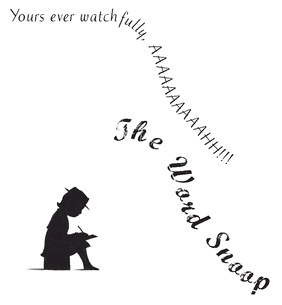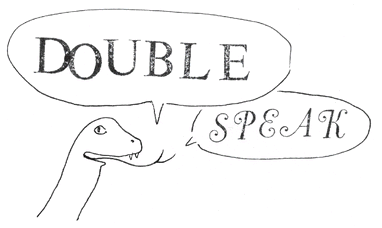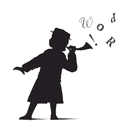The Word Snoop (15 page)
Authors: Ursula Dubosarsky


Well, Word Snoops, there’s not much of my secret message to go. But you’ll need to decipher this code if you want to read the full sentence. (Hint: Did you read the chapter on mondegreens?)
FOOL LEAK WALLY FIE DAND
Answers
MONDEGREENS
1.
Oh, say can you see?
Oh, say can you see?
2.
Sleep in heavenly peace
Sleep in heavenly peace
3.
The answer, my friends, is blowing in the wind
The answer, my friends, is blowing in the wind
4.
Knock, knock, knocking on heaven’s door
Knock, knock, knocking on heaven’s door
ONOMATOPOEIA
1.
Ping-Pong
Ping-Pong
2.
Hiss
Hiss
3.
Cuckoo
Cuckoo
4.
Murmur
Murmur
PORTMANTEAU WORDS
1.
Fighting mangos
—
a cross between “commando” and “mangos”
Fighting mangos
—
a cross between “commando” and “mangos”
2.
When you feel “nervous” and “excited”
When you feel “nervous” and “excited”
3.
A cross between “dreaming” and “thinking”
A cross between “dreaming” and “thinking”
4.
An instrument that is half “piano,” half “trumpet”
An instrument that is half “piano,” half “trumpet”
Dear Snoops,
Words are sneaky. Sneaky, tricky, and hidden.
(A bit like the Word Snoop.) You never quite
know what they’re saying to you, or what they
really mean, or what traps they’re hiding. You
have to listen very carefully sometimes, and
speak and write even more carefully.
(A bit like the Word Snoop.) You never quite
know what they’re saying to you, or what they
really mean, or what traps they’re hiding. You
have to listen very carefully sometimes, and
speak and write even more carefully.
But don’t be afraid!
If you fall down a hole into a terrible deep
darkness, I’ll pull you out.
darkness, I’ll pull you out.
Right after I pull myself out, actually . . .
Read on,

8.
Hmm I wonder what you’re really Saying...
EuphemismsDear Aunt Martha,
Thank you for the remarkable sweater. It will be just the right size in three years time. And what an unusual color
—
I’m sure that nobody else will ever put it in their bag at school and take it home by accident.
—
I’m sure that nobody else will ever put it in their bag at school and take it home by accident.
As always, I appreciate you thinking of me in such an unexpected way.
Your nephew,
Alfred
I wonder, do you think Alfred really liked the present that Aunt Martha sent him? Have a good look at what he’s written. What can you discover about the sweater? That it’s too big, that it’s a color nobody else would like . . . Why doesn’t he just say so? Well, it can be hard to say that sort of thing directly. At times like this, we often use something called euphemisms.
A euphemism is the name given to the ways we find to say things that people don’t really want to hear or that make them feel uncomfortable. The word
euphemism
comes from the ancient Greek words
eu,
meaning “good,” and
pheme,
meaning “something spoken.”
euphemism
comes from the ancient Greek words
eu,
meaning “good,” and
pheme,
meaning “something spoken.”
One of the earliest euphemisms was the name the Greeks gave to some of their goddesses called the Furies. The Furies were not very pleasant—they had hair made of snakes and drove people to their deaths. (Urgh!) Understandably, they made the Greeks feel a bit nervous, so instead of calling them “the Furies,” they called them by the euphemism “the Kindly Ones”! Maybe they thought they might forget to be furious and become kind instead. (It was worth a try . . .)
Most euphemisms are used for things people find embarrassing to say out loud. For example, in restaurants the toilets are often called
restrooms
—and let’s face it, you’re not going to lie down and have a little sleep in there, are you? (Are you?)
restrooms
—and let’s face it, you’re not going to lie down and have a little sleep in there, are you? (Are you?)
Funnily enough, the word
toilet
itself was originally a euphemism. It’s from a French word
toile,
a piece of cloth you used to put around your neck while washing, or on your dressing table. It started to be used as a euphemism for the . . . you know, the . . . Anyway, now we think even the word
toilet
is not quite polite!
toilet
itself was originally a euphemism. It’s from a French word
toile,
a piece of cloth you used to put around your neck while washing, or on your dressing table. It started to be used as a euphemism for the . . . you know, the . . . Anyway, now we think even the word
toilet
is not quite polite!
Once you start listening or looking, you’ll find euphemisms everywhere. It might not be a particular expression, but a way of saying something indirectly, like Alfred’s letter. It’s pretty handy when you have to break some bad news. Like:
Don’t Mention It“Hey, have you ever thought of getting
a pet mouse?”
a pet mouse?”
(Translation: Your guinea pig just escaped from
its cage and ran off down the street.)
its cage and ran off down the street.)
Or:
“Luckily, you won’t have to leave room
for dessert tonight.”
“Luckily, you won’t have to leave room
for dessert tonight.”
(Translation: I just finished all the chocolate
mousse and now there’s none left.)
mousse and now there’s none left.)
Death, which nobody likes to think about, probably has the most euphemisms of any word. Some of them are:
passed away, no longer with us, sleeping with the fishes, permanently out of print—
on and on they go.
passed away, no longer with us, sleeping with the fishes, permanently out of print—
on and on they go.

The British comedy team Monty Python did a very funny sketch you may have seen about a man who brings a dead parrot back to the pet shop where he bought it. The man tries to tell the pet-shop owner that the parrot is dead, but the owner pretends not to get the message. The man uses every euphemism he can think of. He says the bird is:
bereft of life
gone to meet his maker
fallen off the twig
pushing up daisies
passed on
kicked the bucket
joined the choir invisible,
etc. etc.
gone to meet his maker
fallen off the twig
pushing up daisies
passed on
kicked the bucket
joined the choir invisible,
etc. etc.
Finally he shouts out in exasperation: “This is an
EX-PARROT
!”
EX-PARROT
!”
Euphemisms for death are often used out of kindness, because the truth can be so painful. Read the scene on the next page from Charles Dickens’s wonderful novel
David Copperfield.
David is away at boarding school and is being told that his mother has died.
David Copperfield.
David is away at boarding school and is being told that his mother has died.
“When you came away from home at the end of the vacation,” said Mrs. Creakle, after a pause, “were they all well?” After another pause, “Was your mama well?”
I trembled without distinctly knowing why, and still looked at her earnestly, making no attempt to answer.
“Because,” said she, “I grieve to tell you that I hear this morning that your mama is very ill.”
A mist rose between Mrs. Creakle and me, and her figure seemed to move in it for an instant. Then I felt the burning tears run down my face, and it was steady again.
“She is very dangerously ill,” she added.
I knew all now.
“She is dead.”
There was no need to tell me so. I had already broken out into a desolate cry, and felt an orphan in the wide world.
It’s definitely kinder at times to use euphemisms than to say something straight out. This is probably why teachers are such experts at euphemisms, especially in school reports. Parents who think their child is adorable might get upset if they hear that she mucks around a lot and never stops talking, so instead the teacher will write on her report card that she is
always coming up with fascinating ideas to liven up the classroom
and has
truly astonishing vocal cords.
always coming up with fascinating ideas to liven up the classroom
and has
truly astonishing vocal cords.
Hmm, what do you think the teacher was trying to say on these pupils’ report cards?
Gretchen has a remarkable feel for color.
Octavio is very thorough and
never rushes his tasks.
never rushes his tasks.
Lupin always takes a great interest
in the work of his classmates.
in the work of his classmates.
(Translations: Gretchen regularly spills paint everywhere; Octavio is always the last to pack up at the end of the day; Lupin copies other people’s answers.)
DoublespeakThere’s another sort of euphemism sometimes known as doublespeak. It comes about not from kindness or embarrassment, but from the need to hide the truth, or make something that’s not very appealing sound better.
This happens a lot when people are buying and selling. Look at advertisements in the newspaper or on the Internet.
Pre-loved
means anything secondhand. A
historic property
could mean a house that’s so old it’s falling to pieces. And let’s face it,
nice leafy garden
sounds better than “previous owner planted huge patch of lettuces.”
Pre-loved
means anything secondhand. A
historic property
could mean a house that’s so old it’s falling to pieces. And let’s face it,
nice leafy garden
sounds better than “previous owner planted huge patch of lettuces.”
Doublespeak is particularly useful when something has gone wrong and nobody wants to admit it. For example, if the school cafeteria was robbed overnight and all the food was stolen, the principal might stand up in assembly and say, “Unfortunately the cafeteria will not be opening today owing to an
unexpected lack of supplies
.” After all, nobody wants to admit to leaving the door to the cafeteria unlocked, do they?
unexpected lack of supplies
.” After all, nobody wants to admit to leaving the door to the cafeteria unlocked, do they?
Charles Dickens wrote about the dark side of this sort of euphemism in his novel
Little Dorrit.
In
Little Dorrit,
there’s a terrible place called the “Circumlocution Office,” where no one ever says what they really mean.
Circumlocutio
is Latin for “roundabout speech”—that is, saying something with so many words that it’s difficult to tell what’s actually being said. This kind of euphemism was made fun of in the 1980s British television series
Yes Minister,
which was about a government office where people used a lot of words to make sure nobody could understand them. For example, if a character said
The matter is under consideration,
what they really meant was “we’ve lost the file.” (If they said
The matter is under
active
consideration,
it meant they were desperately trying to find the file!)
Little Dorrit.
In
Little Dorrit,
there’s a terrible place called the “Circumlocution Office,” where no one ever says what they really mean.
Circumlocutio
is Latin for “roundabout speech”—that is, saying something with so many words that it’s difficult to tell what’s actually being said. This kind of euphemism was made fun of in the 1980s British television series
Yes Minister,
which was about a government office where people used a lot of words to make sure nobody could understand them. For example, if a character said
The matter is under consideration,
what they really meant was “we’ve lost the file.” (If they said
The matter is under
active
consideration,
it meant they were desperately trying to find the file!)

Have a look at the statements on the next page issued by a modern-day Circumlocution Office. Can you figure out what on earth they’re trying to tell you? (Hint: They are well-known proverbs.)

Other books
The Marriage Act by Alyssa Everett
Hot SEALs: Guard Dog (Kindle Worlds) (Stone Hard SEALs Book 3) by Sabrina York
The Ruins (An Avernus Island Tale) by Jennifer Kohout
The Oxford History of World Cinema by Geoffrey Nowell-Smith
Waiting For You by Ava Claire
The Crystal Sorcerers by William R. Forstchen
The Sable Moon by Nancy Springer
The Brodsky Affair: Murder is a Dying Art by Ken Fry
Homer & Langley by E. L. Doctorow
Unforgiven (A Cyn and Raphael Novella Book 3) by Reynolds, D. B.